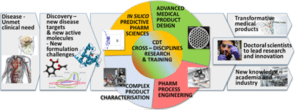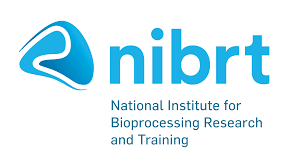
EPSRC-SFI Centre for Doctoral Training (CDT) in Transformative Pharmaceutical Technologies. The CDT is funded through a partnership between the Engineering and Physical Sciences Research Council (EPSRC) in the UK, and Science Foundation Ireland.
Website: https://www.transpharmtech-dtc.ac.uk/
Each year, the CDT recruits a total of 15 students: six at University of Nottingham, six at University College London, and three at SSPC distributed between three SSPC Higher Education Institution (HEIs): Trinity College Dublin (TCD), University College Cork (UCC) and University College Dublin (UCD). The first 15 students started in September 2019.
Future pharmaceutical skills requirements are becoming increasingly demanding, requiring a flexible and agile workforce. The CDT aims to develop the holistic skill set required for our graduates to be future research and industry leaders in both research-intensive and manufacturing industry environments. The structured training programme has been designed to meet needs identified by (i) our partners and wider pharmaceutical and healthcare sector, as well as (ii) professional bodies (e.g. Academy of Pharmaceutical Sciences (APS), the Association of the British Pharmaceutical Industry (ABPI)) and (iii) partner Higher Education Institutions in the UK and Ireland.
The training is designed to ensure graduates will ultimately be effective employees in the industry. The CDT provides further training in all four years of the PhD programme, including action-based learning, summer schools, and entrepreneurship courses, as well as career events with our industrial partners and alumni such as CV Clinics. The CDT encourages student participation in events that further develop entrepreneurial skills. The Graduate Schools at UoN, UCL and SSPC universities also provide institutional support to the CDT training throughout the 4-year programme in the areas of managing research, research skills & governance, writing, communication and networking skills, career planning and employability. The industry training projects/industry placements are critical aspects of the training programme, providing an opportunity for students to become immersed in an industrial environment.
The CDT equips doctoral scientists in Ireland and the UK to drive innovation in the pharmaceutical and healthcare sectors. Through an integrated academia-industry partnership and training programme, our CDT trains students in a unique cross-disciplinary interface between engineering, computational, pharmaceutical, and medical sciences under 4 core science themes (i) predictive pharmaceutical sciences, (ii) advanced product design, (iii) pharmaceutical process engineering, and (iv) complex product characterisation.
Excellence in the education of students

All three SSPC HEIs (Trinity College Dublin, University College Cork and University College Dublin) have world class state of the art research facilities. All standard synthetic and characterisation techniques (e.g. diffraction, calorimetry, microscopy, IR/Raman spectroscopy, NMR) are widely available. The three SSPC HEIs have complementary infrastructural resources which are available to all CDT students. These include an advanced pharmaceutical processing and characterisation facility in TCD, a biopharmaceutical processing and formulation suite in UCC, and a pharmaceutical and bioprocess engineering facility in UCD. Additionally, UCD Chemical and Bioprocess Engineering has a strategic partnership with the National Institute for Bioprocessing Research and Training (NIBRT) and most of the PIs at NIBRT hold joint or adjunct appointments with UCD, enabling them to supervise/co-supervise CDT students.

Building on this strategic partnership with NIBRT, SSPC has embedded 2 full days of practical training at NIBRT’s biopharmaceutical manufacturing facility into Training Module 6 (Pharmaceutical processes and manufacture), where our CDT students participate in hands-on practical sessions that include the use of disposable technologies, column packing operations and fill finish processes. This module also includes a Leadership Training workshop which combines theory with interactive leadership exercises that encourage open communication and sharing of ideas. This training is delivered by a leadership expert in conjunction with Tangent, Trinity’s Ideas Workspace.
Selection of CDT PhD student publications, in 2020-2022 (from a total of 17 total publications to date)
- Myślińska, M., Stocker, M.W., Ferguson, S., Healy, A.M. A Comparison of Spray-drying and Co-precipitation for the Generation of Amorphous Solid Dispersions (ASDs) of Hydrochlorothiazide and Simvastatin. Journal of Pharmaceutical Sciences (2023).
- Chullipalliyalil, K., Elkassas, K., McAuliffe, M.A.P., Vucen, S., Crean, A. In-Vial Detection of Protein Denaturation Using Intrinsic Fluorescence Anisotropy. Analytical Chemistry, 95(5) (2023) 2774–2782.
- Trenfield SJ, Januskaite P, Goyanes A, Wilsdon D, Rowland M, Gaisford S, Basit AW. ‘Prediction of Solid-State Form of SLS 3D Printed Medicines Using NIR and Raman Spectroscopy’, Pharmaceutics, 14(3) (2022) 589.
- McCoubrey, Laura E. Batchelor, Hannah Basit, Abdul W. Gaisford, Simon Orlu, Mine. ‘Impact of the Microbiome on Oral Biopharmaceutics’, Book chapter: title Biopharmaceutics, (2022).
- Khaled K, Krishnakumar C, Michael MA, Sonja V, Abina C. ‘Fluorescence spectroscopy for the determination of reconstitution time of an in-vial lyophilised product’, European Journal of Pharmaceutics and Biopharmaceutics, 597 (2021) 120368.
- Tsolaki E, Stocker M, Healy AM, Ferguson S. ‘Formulation of ionic liquid APIs via spray drying processes to enable conversion into single and two-phase solid forms’, International Journal of Pharmaceutics, 603 (2021) 120669.
- Awad, A. Madla, C. M. McCoubrey, L. E. Ferraro, F. Gavins, F. K. H. Buanz, A. Gaisford, S. Orlu, M. Siepmann, F. Siepmann, J. Basit, A. W. ‘Clinical translation of advanced colonic drug delivery technologies’, Advanced Drug Delivery Reviews (2022)
















